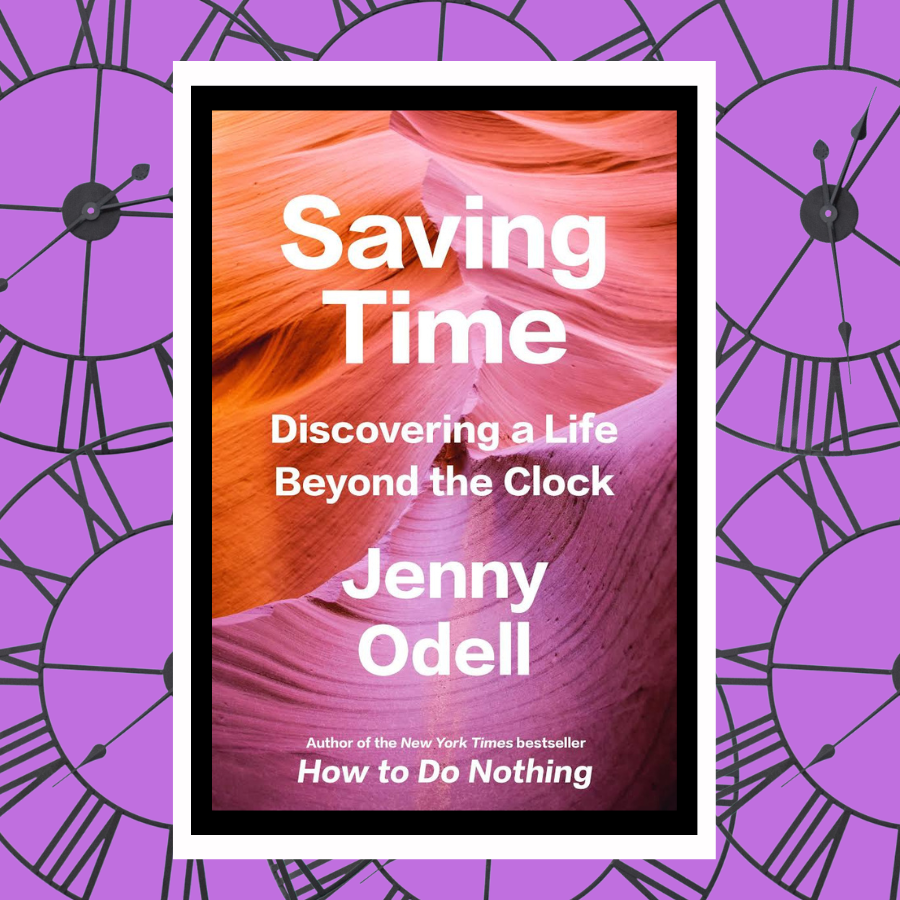This post may include affiliate links, which means we make a small commission on any sales. This commission helps Feminist Book Club pay our contributors, so thanks for supporting small, independent media!
Saving Time: Discovering a Life Beyond the Clock is not a self help book, even if its name might lead you to believe otherwise. In fact, in it, Jenny Odell rails against the individualistic productivity hacking, time managing and life-optimizing that many of the most popular self help books prescribe. In doing so, she might actually help us all.
Sometimes a treatise, sometimes a travelogue, Saving Time looks at time on a number of levels and through a variety of lenses. Organized reflections and ruminations are interspersed with vivid descriptions of Odell’s travels to and through nature, a community library, and a crematorium, among other locations. These points of reference give us alternative views and ways of thinking about time, or are places Odell depicts as out of time or existing on different timelines than the ones we are used to. These descriptions–full of the kind of attention to flora, fauna and backyard birdlife anyone who has read Odell’s other book, How to Do Nothing, will expect and appreciate–are necessary and orienting for a book that examines a concept as all-encompassing and difficult to pin down as time.
Taking on time from so many angles can be a little dizzying. The view changes from page to page, but it’s a book that builds on and refers back to itself. In that interplay, Odell does something masterful. Like Euphemia Russell’s Slow Pleasure (a nice companion read to this book, it turns out), Saving Time regularly invites the reader to slow down, step off the wheel of productivity and take notice.
Odell points at labor and the ways that its principles have spilled into and organized our lives, how theories of the management of workers on a factory floor led to theories of managing time and thought. Making a similar argument to Rina Rapael’s Gospel of Wellness, Odell critiques the resulting culture that places an inordinately high value on morning routines, what Odell describes as the “neoliberal worldview of total competition,” where “everyone else becomes your competition while you jealously guard and ‘supercharge’ the time you possess.”
This way of prizing productivity is inherently self-serving. It is also only a way of living attainable by very few. Odell acknowledges the differences between the time allotted to some and not to others throughout the book, such as how time is affected by race and class and how caregivers’ time is sectioned and organized in completely different ways than other people’s. In this, she echoes much of what Angela Garbes tackles in her Essential Labor: Mothering as Social Change and she comes to many of the same conclusions as Garbes does. Namely, there are entire groups of people who, based on various systemic inequities, are what we might see as “time poor” and that the only way towards change is to consider things like communal care, fairer work weeks, more equitable forms of pay, and greater systems of support for families.
A central point of Saving Time, in my view, is that we can’t improve the world by improving ourselves. We need to look outward.
And Odell looks all over, turning to her experiences, to philosophers, writers, and theorists, and the arc of time as it plays out in nature. She looks at leisure, and the spaces that are outside of working time. She ponders the conception of time across ages and cultures, among trees and moss and mushrooms, and in non-western configurations. She considers the clicking clock of climate crisis, and also our own mortality. She considers what it is to exist in the here and now and how time and place converge.
As a result of all of this searching, Saving Time is deeply insightful, resonant, and full of wisdom, about the time in which we are living and the conception of time in general. In my favorite part of the book, Odell makes a compelling argument for viewing time as beans–something that can be used and given, but also planted, propagated and renewed–as something other than a commodity.
I love to think of time as a thing we can garden and I think this is what Odell is saying again and again. We don’t need optimization. We need to realize our own aliveness and acknowledge the aliveness of others. We need to work towards policy change. We don’t need a habit stacking strategy, we need to meet our neighbors, to grow to know them, and then to meal train with them and find ways to pool our resources so that our time is more equitable and balanced, so more people have a chance to truly live.
For this message, this is a book worth reading and passing along to everyone you know.


